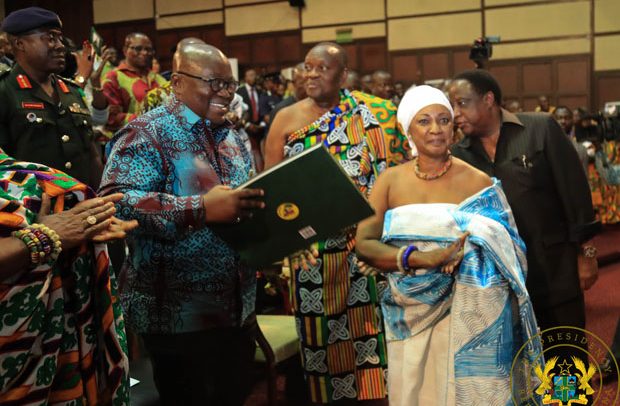President Akufo-Addo receives a commemorative book from Okyeman Traditional Council
President Akufo-Addo says the new generation of Ghanaian historians and writers has a special responsibility to continue with the works of the late great historian, Prof. Albert Adu Boahen and his epigones.
President Akufo-Addo disclosed this at the re-launch of Prof. Robert Addo-Fening’s book, titled “Akyem Abuakwa, 1700-1943 from Ofori Panin to Sir Ofori Atta” on Monday as part of activities commemorating the 75th anniversary of the death of Nana Ofori Atta I.
Recounting the history of writings on the continent, the President noted that notwithstanding the massive evidence of 10th Century Al-Azhar University in Cairo and 10th Century Sankore University in Timbuktu, and their manuscripts, several people accepted and believed that there was no written history of Africa.
However, some insisted that these early writings were not set out in a chronological framework and at best provided information on earlier ethnic societies and traditional states, he added.
President Akufo-Addo noted that literary works such as C.C Reindorf in “The History of the Gold Coast and Ashanti,” John Mensah Sarbah in “Fante Customary Laws,” Joseph Casely-Hayford in “Gold Coast Native Institutions,” and J.B. Danquah in “Akan Laws and Customs,” among others, fell into this category.
“It was, thus, left to the new generation of professionally-trained Ghanaian historians of the post-independence era to take up the challenge thrown at their forebears for nearly three centuries,” he added.
The President continued, “Under the direction of the great historian, Professor Adu Boahen, then Head of the Department of History at the University of Ghana, Legon, during the 1960s and 1970s, a coterie of young, enthusiastic undergraduates of history was offered scholarships to undertake post-graduate studies abroad.”
They included K.Y Daaku, author of “Trade and Politics on the Gold Coast 1620-1720, J.K Fynn, author of “Asante and its Neighbours 1700-1807, Divine Amenumey, author of “The Ewe unification movement: a political history; Kofi Afrifah, author of the “Akyem Factor in Ghana’s History, A.A Iliasu, author of “The origins of the Mossi-Dagomba States and Kwamena-Poh, author of “Government and Politics in the Akuapem State.”
Among those who were trained locally under Adu Boahen’s supervision were Francis Agbodeka, author of “An Economic History of Ghana from the Earliest Times,” Irene Korkoi Odotei (neé Quaye), author of “External Influences on Ga Society and Culture” and Robert Addo-Fening.
The re-launch of the book published by Prof. Addo-Fening, “one of Adu Boahen’s most prominent protégés, is the first comprehensive, historical study of the rise and growth of Akyem Abuakwa, originally published 21 years ago in 1997 by the University of Trondheim in Norway by Prof. Addo-Fening, President Akufo-Addo noted.
In eight chapters, the author tells the story of Akyem Abuakwa from its origins in 17th Century Adanse, through its relocation to Banso on the backside of the Atewa hill under Nana Ofori Panin, commonly regarded as the founder of the Akyem State, and subsequently to Kyebi in the valley of the Birim River after 1727, and also insight into the life of Nana Ofori-Atta, as a traditional ruler, legislator and patriot, among others.
Just as Prof Adu Boahen did for him, President Akufo-Addo was happy to learn that Prof. Addo-Fening was also mentoring young historians.
He said he is eagerly awaiting the publication of an MPhil thesis, titled “Nana Sir Ofori Atta and the Process of Educational Change in the Gold Coast (1912-1943) written by Frank Afari, who was supervised by Prof Addo-Fening.
President Akufo-Addo, therefore, urged young historians and writers to help establish that the great continuum of Ghanaian history defines the determination of the Ghanaian people to build a civilisation founded on the values of liberty, common humanity and solidarity.
“The desirable conclusion of that history is the mobilisation of our immeasurable resources to address our problems, discarding a mindset of aid, dependence, charity and handouts and creating a self-reliant prosperous Ghana that will deal with others on the basis of equality and mutual respect,” the President added.
Prof Addo-Fening’s study, he added, is a good pointer for the new generation of Ghanaian historians.


